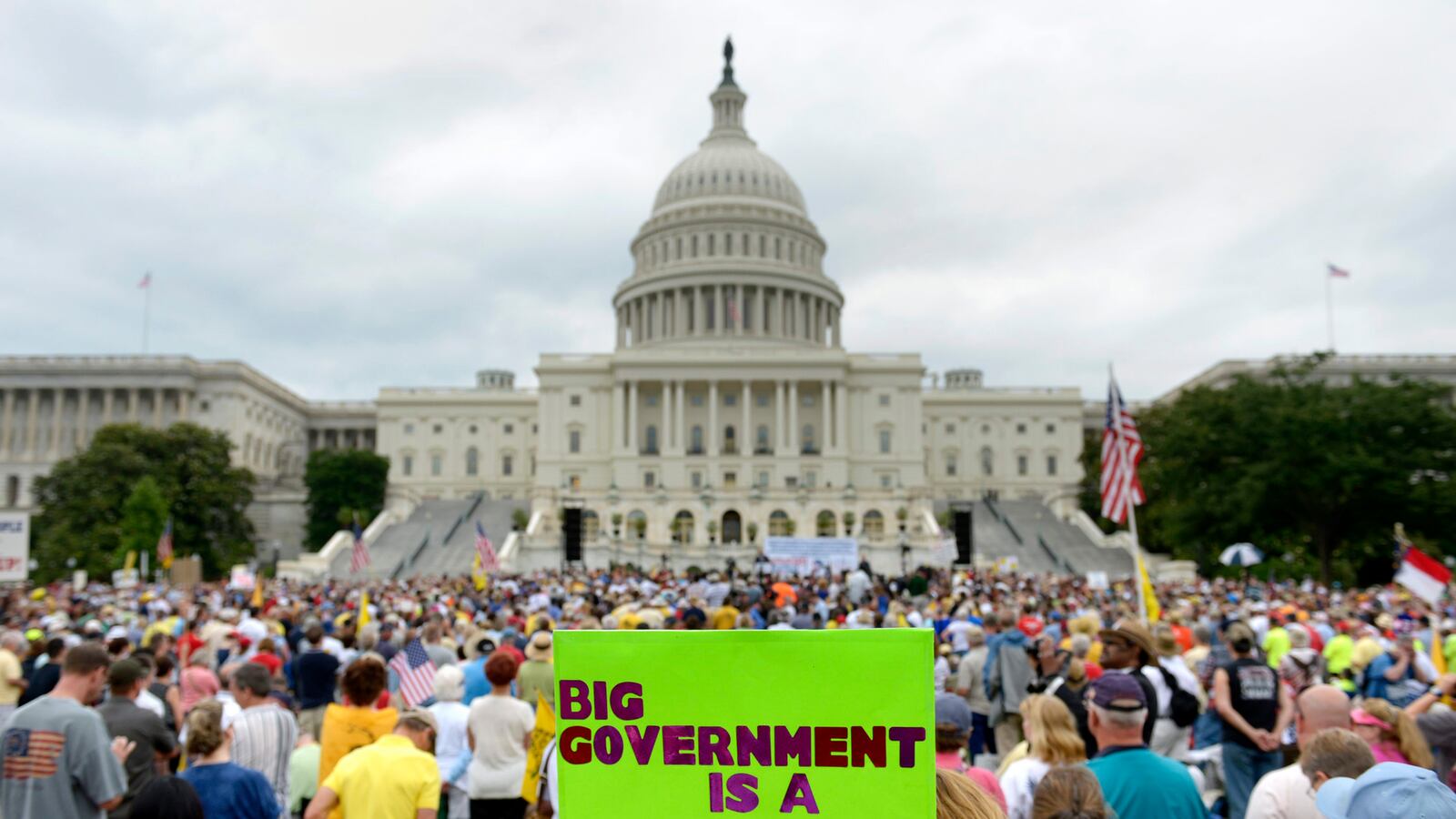The second coming of disgraced and oversexed pols Anthony Weiner (quite probably the next mayor of New York City) and Eliot Spitzer (who has announced a bid for city comptroller) helps to explain widespread and growing contempt for government. Every grandpa in Peoria, every schoolgirl in Seattle, every cartoon of a crying Statue of Liberty is asking the same question: What do you have to do to get banished from government work?

The short answer: you can’t. Government and the people in it can always get worse, less competent, and more appalling. As an ardent believer in what the libertarian philosopher Robert Nozick and others called “the night-watchman state”—that is, the bare minimum in taxes and publicly provided services such as cops, courts, defense, and maybe some roads—I should be thrilled by the hollowing out of faith in government. It should be the first step toward punching Leviathan in the nose and squeezing him down to size.
But what if distrust in government perversely drives demand for more government? That’s the implication of recent research, and it helps explain why the state keeps growing like an Anthony Weiner selfie even as our faith in it shrinks faster than George Costanza in a cold swimming pool.
Weiner and Spitzer may be punch lines, the more serious and unending litany of public-sector snafus is anything but a joke. In just the past few weeks, we’ve learned that the IRS improperly targeted conservative political groups (President Obama himself called that “intolerable and inexcusable”) and that the National Security Agency has been peeking at everything we all do all the time. The economy is still in the crapper despite—read: because of—unending government intervention and the president has unilaterally declared the employer mandate in his “transformational” health-care law inoperative until he says otherwise. The current crop of statesmen in Washington, D.C. has passed exactly one budget since 2009 while driving deficit spending through the roof.
Given all this and more, it’s not surprising when Pew Research concludes that “trust in federal government remains mired near a historic low and frustration with government remains high.” Just 26 percent of Americans trust the government most or all of the time, while 73 percent usually distrust it. Last month, Gallup found among the 63 percent of Americans who see “non-economic issues” as the biggest problem facing the country today, the top issue is “dissatisfaction with government.”
In a comprehensive survey of public attitudes done last September, Gallup found that just 19 percent of Americans think they “can trust the government in Washington to do what is right” “just about always” or “most of the time.” The latest CNN/ORC poll, from mid-June, shows large majorities convinced that Obama is failing on the economy, the deficit, foreign policy, civil liberties, and just about everything else. The one upside? He’s still doing better than Congress.
Which brings us to the 2010 paper “Regulation and Distrust,” written by Philippe Aghion, Yann Algan, Pierre Cahuc, and Andrei Shleifer and published in The Quarterly Journal of Economics. Drawing on World Values Survey data from the past several decades for over 50 countries, the authors help explain what they call “one of the central puzzles in research on political beliefs: Why do people in countries with bad governments want more government intervention?”
The authors make a distinction between “high-trust” and “low-trust” countries. In the former, most people have positive feelings about business and government and the general level of regulation is relatively low. In “low-trust countries,” the opposite is true and citizens “support government regulation, fully recognizing that such regulation leads to corruption.” As an example, they point to differing attitudes toward government-mandated wages in former socialist countries that transitioned to market economies. “Approximately 92 percent of Russians and 82 percent of East Germans favor wage control,” they write, naming two low-trust populations. In Scandinavia, Great Britain, and North American countries, where there are higher levels of trust in the public and private sectors, less than half the population does. As a final kicker, Aghion et al. suggest that increased regulation sows yet more distrust, which in turn engenders more regulation.
It’s this dynamic that has me worried. In the Pew data, which goes back to 1958, the lines for trust and distrust converged in 2002, as the essentially unmitigated disaster that were the Bush years got underway. Trust in government reached a post-9/11 high of 60 percent before starting its long slide toward 26 percent. Distrust over the same period has climbed over 20 points from around 50 percent back in 2001. In every way under Bush, the federal government grew massively. Spending increased by about 50 percent in inflation-adjusted dollars, “economically significant” regulations ballooned by 70 percent, new entitlements (Medicare Part D) and new bureaucracies (the Transportation Security Administration) were hatched. We entered a state of permanent wars (on “terror” and in Iraq and Afghanistan) and the government began secret surveillance.
All of that—and worse—has proceeded apace under Barack Obama, who piled on ineffective (by his own measures) stimulus spending, expanded bailouts, and still-to-be-written financial regulations in addition to his faltering-before-it-begins health care overhaul, presidential kill lists, and more.
It turns out that government may be growing not in spite of our confidence in it, but because of our lack of confidence in it to This self-defeating spiral will only get worse if the United States fails to stem its slide toward being a low-trust country. The first step should entail the government and politicians recognizing that they’ve got a problem. As with any rehab plan, it would do the government—and the rest of us—well to start small and take it one day at a time.
Is it really too much for Congressional Republicans and Democrats to pass a budget for next year (a relatively scant $200 billion separates the House and Senate proposals)? For the president to honestly discuss domestic drone policy? For Anthony Weiner to find honest work?
If it is too much, we’ll have no one but ourselves—and our ever-growing and god-awful government—to blame.






